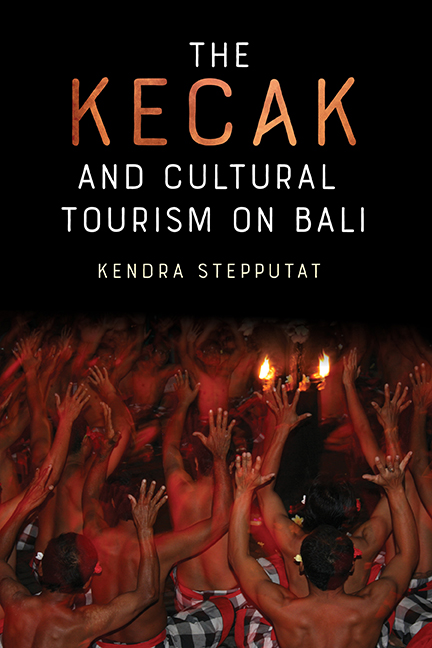Book contents
- Frontmatter
- Contents
- Acknowledgments
- Note to the Reader
- Introduction
- Part 1 The Present
- Part 2 The History
- Appendix 1 Kecak dan Wisata Budaya di Bali (Indonesian Summary)
- Appendix 2 Kecak Groups of Bali in 2000–2001 (Badung and Gianyar)
- Appendix 3 Facsimile of a Letter from Walter Spies to Leo Spies, 1932
- Glossary
- Bibliography
- Index
4 - The Social Organization of Kecak
Published online by Cambridge University Press: 07 October 2022
- Frontmatter
- Contents
- Acknowledgments
- Note to the Reader
- Introduction
- Part 1 The Present
- Part 2 The History
- Appendix 1 Kecak dan Wisata Budaya di Bali (Indonesian Summary)
- Appendix 2 Kecak Groups of Bali in 2000–2001 (Badung and Gianyar)
- Appendix 3 Facsimile of a Letter from Walter Spies to Leo Spies, 1932
- Glossary
- Bibliography
- Index
Summary
Balinese society has many parallel social structures. Every individual is a member of a family, a caste, and different social organizations within a village or area. As Leeman puts it, “Even though Balinese society is clearly stratified by caste and ranking within castes, it should not be forgotten that the Balinese are also members of numerous other overlapping caste groups in addition to their affiliation with kinship groups of various ranks according to their origins.” The forms of social organization that are relevant to understanding how kecak groups are organized are sekaha, banjar, desa adat, and sanggar.
The Balinese term sekaha, also written seka or sekehe, is best translated by the English terms “association,” “corporate group,” or “club.” In addition, Geertz mentions the literal translation “to be as one.” The term banjar could roughly be translated as “neighborhood association.” It is a subdivision of a village consisting of several families ranging in number from fifty to five hundred, who live mostly in the same neighborhood. Every family must be part of a banjar. All members of a banjar have certain duties to the community but also profit from the mutual help of other members in their banjar.
Leeman adds that “after the family and kinship groups, [the banjar is] […] the most important reference group in the life of a commoner.”
Desa adat, literally “village rule,” is a Balinese term that refers to traditional rules that apply in a village. It can also denote a group of people who apply these rules and work in accordance with them. Desa adat all belong to the same village but can be from different banjar.
Finally, sanggar is the Indonesian term for “studio” and refers to a professional, mostly profit-oriented center for the arts, which may or may not take on social responsibilities for the neighborhood (desa or banjar) in offering an arts education for children. Although sanggar are locally operated, they can turn into successful arts organizations that flourish even on an international level.
Just as Leeman did in his article on Balinese social organization, I consider it important to include the Balinese saying “len desa, len adat,”which can be translated as “different village, different rules.” Almost every kecak group I interviewed had a slightly different structure, and some used one term to describe themselves but explained their organization with another.
- Type
- Chapter
- Information
- The Kecak and Cultural Tourism on Bali , pp. 125 - 147Publisher: Boydell & BrewerPrint publication year: 2021

